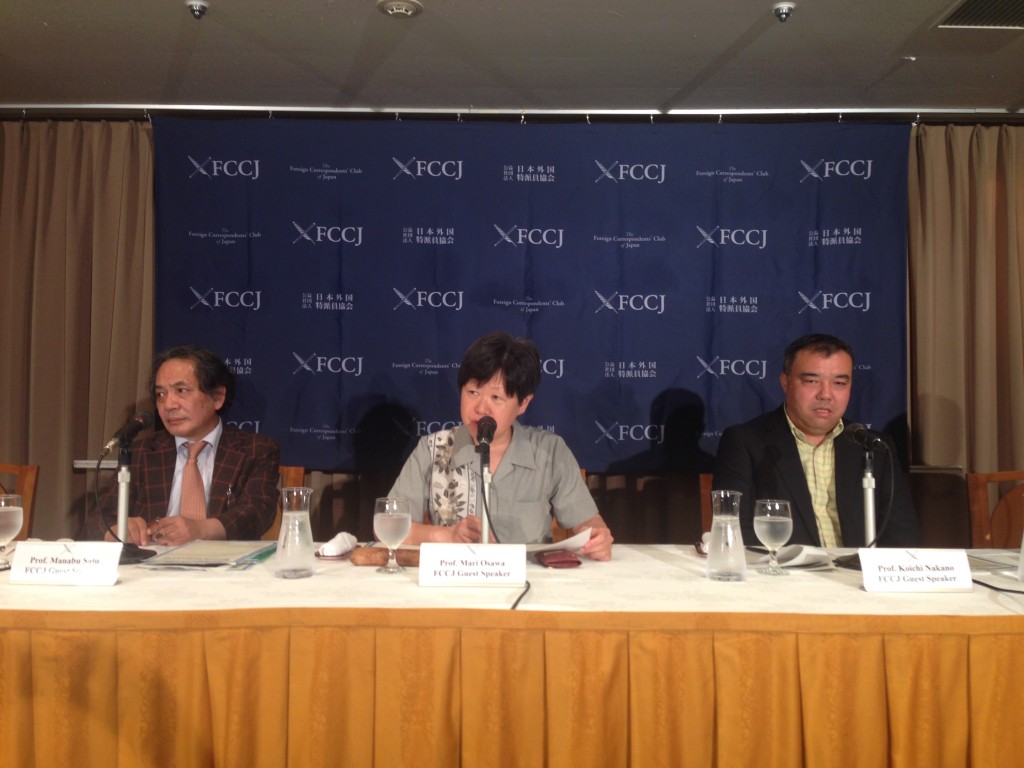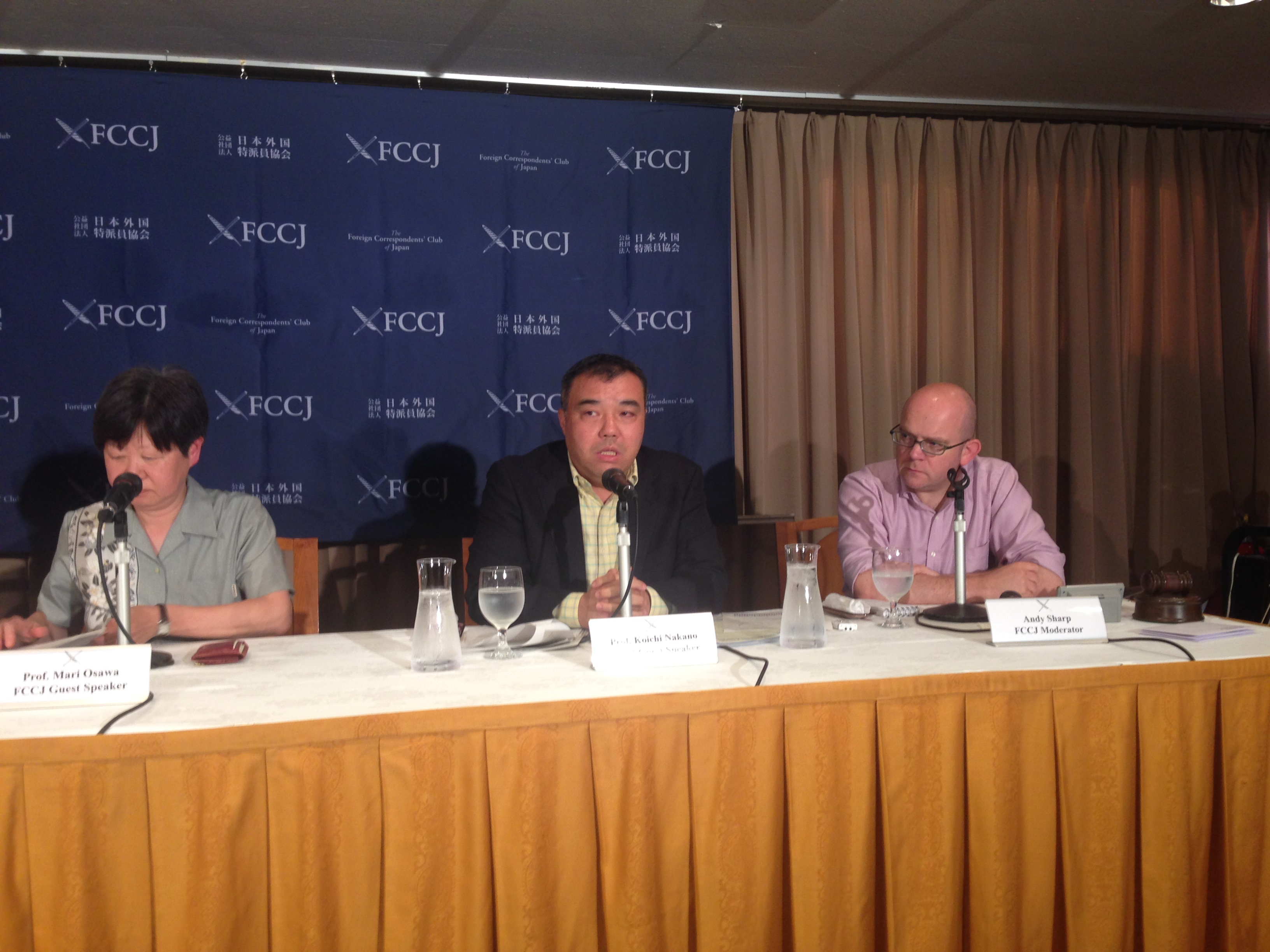During this time of year, walking around Tokyo can often be compared to entering a bowl of soup. Similar metaphors could be used for how lethargic the process has been for scholars such as Sophia Professor Koichi Nakano to get their message heard by Prime Minister Abe about why they believe collective self-defense is unconstitutional. In Nakano’s words: “I think it’s going to be a long, hot summer,” Nakano said. “Each time Mr. Abe opens his mouth, we have less clear an idea of what the bill allows the military to do.” Nakano, along with Mari Osawa and Manabu Sato, visited the FCCJ on Friday to once again explain why more than 95% of political scholars are against this new bill that would increase Japan’s military capabilities.
Recently however, tension between the media and Abe’s party has reached new heights, especially in light of the LDP’s comments attacking the media for being critical of the bill. This in turn prompted FCCJ President James Simms to make a public statement requesting the Government respect the freedom of the press rights given in Japan’s constitution. At Friday’s conference, while some new takes were given—as seen with Osawa who believes the increasing youth poverty rate is more important than the security bill—the most noticeable aspect was how all four speakers subtly called out Abe and the LDP to better explain the bills and specifically explain how they plan to employ the possible new self-defense laws. Even moderator Andy Sharp directed several comments directly to Mr. Abe: “We have a standing invitation to Prime Minister Abe and the LDP to come speak at the club,” Sharp said. “We’ve been refused so far … But again, Mr. Abe, if you’re listening, Nakano Sensei says ‘Hi,’ and we ask you please come to the club and explain the bills to the foreign audience.”
According to Nakano, Abe and his party are only digging themselves a deeper grave with their strategy of avoiding specific explanations of what the bill will allow and lead to, something Nakano thinks simply allows the opposition more time to figure it out: “The societal forces are only going to be growing the days that go by, and the government doesn’t seem to get it because they say they can explain it without actually trying to explain it. But with the passage of time, people are creating a better understanding of the bill, which actually strengthens the opposition.”

In news journalism, one of the main goals has always been to report facts how they are, with minimal amounts of our own opinions tainting the reality of what’s happening. But over the past weeks, the media has been forced to defend itself and play a role other than simple reporters. Throughout the conference, Nakano characterized Abe and his party’s not-so-subtle intimidation of the media as being “high handed,” because they refuse to adequately explain the bills and then seem defensive when questioned about it. In response to whether there is a connection between the plan to gradually eliminate humanities from public universities and the security laws, Nakano said it definitely aligns with the government’s past resistance to the media and its new plan to punish teachers who are considered ‘biased’ for any controversial stances they teach.
“I don’t think there’s a direct connection since as of now it’s just a plan,” Nakano said. “But the government doesn’t particularly welcome active citizenry, and I think even though they are lowering the voting age to 18, the LDP politicians have began saying if there’s biased teaching in classrooms, they will institute punitive measures against those teachers, as if they have the monetary right to determine what constitutes politically ‘biased’ teaching.” So it seems to be clear people like us in academia are not just enclosing ourselves in the laboratories and offices, but we try to put our specializations towards contributing to what’s happening.”
In these final stages of the legislation being passed, the academic analysis has somewhat been given up on by the many politicians and scholars arguing against the bills, instead joining the protests being held by the many different groups of both officials and the public, all of which refuse to accept that Abe can simply pass the laws without approval of most of the country. On Friday night, a couple hundred people gathered around the National Diet building to protest the bill, which included five drummers, a conch-shell blower and many chants telling Abe to stop, (a lot of “Abemo Yamero!”). The police ended the protest soon after eight even though it was planned to go on another hour or so. If it so happens that Mr. Abe sees the press conference or finally listens to the media that has largely joined the public in protest, hopefully he will soon face the music and avoid the big riots that would ensue if the bill is indeed passed on July 15.
